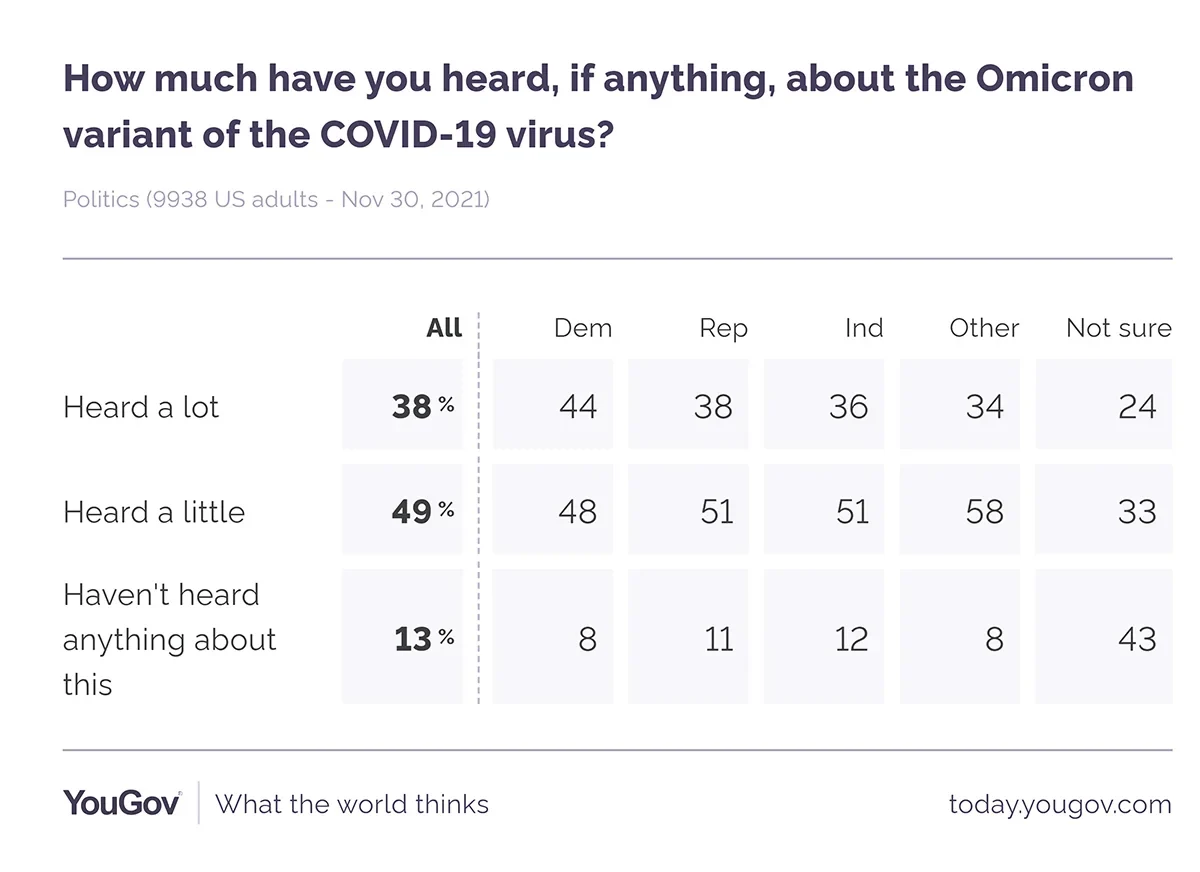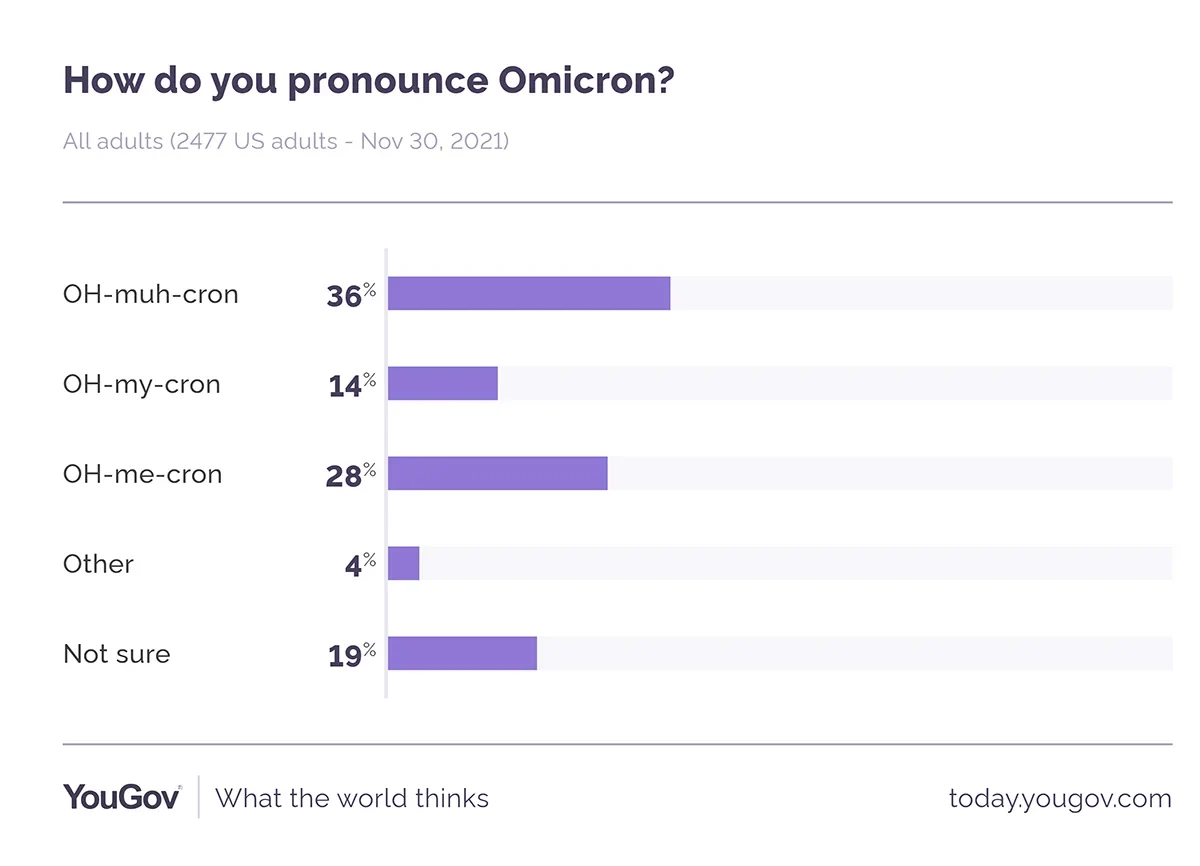Last week, the Omicron variant of the COVID-19 virus was identified by health officials in South Africa. The World Health Organization labeled Omicron a “variant of concern” but warned that it would take time to determine whether the variant was more infectious or lethal than its predecessors. The uncertainty sparked new travel bans and concerns about what the new form of the virus could bring.
Data from YouGov shows that most Americans are aware of the Omicron variant, with 87% of U.S. adults saying they have heard a lot (38%) or a little (49%) about it. (That’s slightly higher than the 82% of Americans who had heard a lot or a little about the Delta variant in late June.) Democrats, Republicans, and Independents all are similarly likely to say they are aware of Omicron, but that does not mean they are similarly likely to express concern.Who is worried about the Omicron variant?

Most Americans are concerned about the new variant (54%, slightly less than were concerned about Delta in June), but it’s Democrats who are the most worried. Four in five Democrats (80%) describe being very concerned (34%) or somewhat concerned (46%) about Omicron. Just one-third of Republicans (35%) are very (12%) or somewhat (23%) concerned about the newly discovered strain.
A majority of Republicans (59%) say they are not very concerned or not concerned at all, compared to 14% of Democrats.
Three in five Americans (60%) believe that Omicron poses a threat to at least some Americans, with 38% saying it’s a serious risk to all Americans. Nearly one in five (17%) believe that Omicron is only a concern for unvaccinated people, while 5% say it is only a risk for vaccinated people. About one-quarter (24%) are not sure about the risk it brings. (In June, 72% of Americans said Delta posed a serious risk to at least some Americans.)
One-third of Republicans (33%) say the Omicron variant is not a serious risk for any Americans, compared to 16% of adults overall and 1% of Democrats.
Which countries should fall under the U.S. travel ban?
President Joe Biden banned visits from eight countries in southern Africa by non-U.S. citizens after the World Health Organization designated Omicron a “variant of concern.” The president of South Africa, Cyril Ramaphosa, condemned the travel ban as “not informed by science” and said that it will not be effective in preventing the spread of the Omicron variant.
Three in 10 Americans (30%) say that they would support a travel ban being enforced only against all countries where Omicron cases are confirmed. About one in five (19%) want to ban travel from all countries because of the new variant, while 12% support a travel ban exclusively against countries in southern Africa. Even more (16%) say that no travel bans are necessary, with Republicans (23%) being more likely than Democrats (10%) to say this.
How do you pronounce Omicron?
Americans are twice as likely to say they prefer to call the variants of the COVID-19 virus by Greek letters (44%) rather than the names of the countries where they were first identified (23%). Democrats overwhelmingly prefer Greek letters to names of countries (58% to 12%), while Republicans prefer names of countries (39% to 24%). More Americans said they preferred naming variants by geographic origin than by Greek letters when asked a similar question in June.
In the days since news about the Omicron variant circulated, Americans began to search for how to pronounce the Greek name. More than one-third (36%) say they call it “OH-muh-cron,” while 28% call it “OH-me-cron.” Even fewer say Omicron as “OH-my-cron.” About one in five (19%) are still uncertain about how to pronounce it. (There is no clear correct answer.)

Explore the YouGov toplines and crosstabs from this story below
- How much have you heard, if anything, about the Omicron variant of the COVID-19 virus?
- How concerned are you about the Omicron variant?
- From which group of countries would you support a travel ban to the U.S. because of the Omicron variant, which was first identified in South Africa?
- How do you pronounce Omicron?
- Which naming convention do you prefer for variants of the COVID-19 virus: Greek letters such as Delta or Omicron, or names of countries where first identified such as India or South Africa?
- Which comes closest to your view about the Omicron variant of the COVID-19 virus?
Methodology: YouGov surveyed 9,938 U.S. adults for a poll on November 29 - 30, 2021, and another 2,477 U.S. adults for a poll on November 30, 2021. The samples were weighted to be representative of the U.S. population, based on gender, age, race, education, U.S. census region, and political party.
Image: Getty











